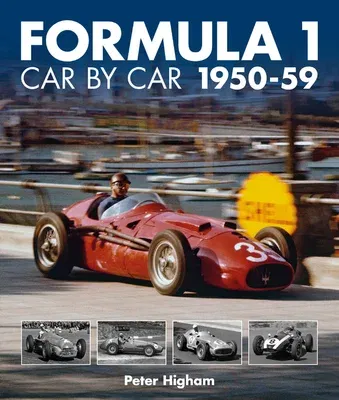The formative years of the 1950s are explored in this fourth
installment of Evro's decade-by-decade series covering all Formula 1
cars and teams.
When the World Championship was first held in 1950, red Italian cars
predominated, from Alfa Romeo, Ferrari and Maserati, and continued to do
so for much of the period. But by the time the decade closed, green
British cars were in their ascendancy, first Vanwall and then
rear-engined Cooper playing the starring roles, and BRM and Lotus having
walk-on parts. As for drivers, one stood out above the others, Argentine
Juan Manuel Fangio, becoming World Champion five times. Much of the
fascination of this era also lies in its numerous privateers and
also-rans, all of which receive their due coverage in this complete
work.
Year-by-year treatment covers each season in fascinating depth, running
through the teams -- and their various cars -- in order of importance.
Alfa Romeo's supercharged 11/2-litre cars dominated the first two years,
with titles won by Giuseppe Farina (1950) and Fangio (1951). The new
marque of Ferrari steamrollered the opposition in two seasons run to
Formula 2 rules (1952-53), Alberto Ascari becoming champion both times,
and the same manufacturer took two more crowns with Fangio (1956) and
Mike Hawthorn (1958). Maserati's fabulous 250F, the decade's most
significant racing car, propelled Fangio to two more of his five
championships (1954 and 1957). German manufacturer Mercedes-Benz stepped
briefly into Formula 1 (1954-55) and won almost everything with Fangio
and up-and-coming Stirling Moss. Green finally beat red when the
Vanwalls, driven by Moss and Tony Brooks, won the inaugural
constructors' title (1958). Then along came Cooper, rear-engine
pioneers, to signpost Formula 1's future when Jack Brabham became World
Champion (1959).

